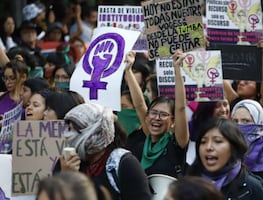Más Información

Secretaria de las Mujeres busca disminuir feminicidios con promotoras de derechos; creará línea para atención a víctimas

Diputada María Teresa Ealy Díaz promueve unidad y tradición en la CDMX; celebra Día de Reyes en la MH

Comisión de Defensa en San Lázaro avala reforma sobre ascensos para médicos militares; busca incentivar especialización

Buscan vinculación a proceso de hotelero por fraude en Baja California Sur; afectados fueron secuestrados al exigir pago

Senado alista mecanismo para garantizar elección judicial tras suspensión del Comité del PJF; Noroña acusa sabotaje
Mexico City is getting a little closer to statehood
The Federal District has long been considered an administrative district run by the central government, much like Washington, D.C. traditionally was in the United States.
But the city of 8.85 million is getting more independence under a measure signed into law by President Enrique Peña Nieto on Friday. The capital will lose the designation "federal district" as it gains greater independence in the latest stage in the city's long, somewhat equivocal relationship with the rest of the country.
Many people in Mexico, and even highway road signs, still refer to the city simply as "Mexico."
The city has been the center of the country's identity throughout the Spanish colonial era and since independence in 1821. It's named after the people who founded it, the Mexica Indians, known as the Aztecs, and the name came to stick for the country as a whole, even though the Mexicas called the city "Tenochtitlan."
The country's flag depicts the myth of the city's founding in 1325, when an eagled perched on a cactus was seen seizing a snake.
It's central role and perceived arrogance has long irritated many around the country. Referring to the chaotic city's mailing address, Mexico DF, many jokingly referred to it as "Mexico DeFective."
Under the new status, the city's borough leaders will become mayors. The city council will be able to vote - like the rest of Mexico's 31 state legislatures - on constitutional reforms.
The current mayor already has near-governor status. His new role, and that of the new mayors, will be determined by a special assembly within the next year.
The country's president will still be able to dismiss the city's top law enforcement officer for serious offenses, and the city may not have the same fiscal responsibilities or relationship with its mayors as a state would have.
The city was run by the central government until 1997, when residents were allowed to elect their leaders.
But it is still unclear what the official term for the city's residents will be. The now-obsolete DF abbreviation led to the term "Defenos." They are frequently referred to by themselves and others by the slang term "Chilangos," whose origin is uncertain.
Most residents interviewed by telephone by EL UNIVERSAL this week said they would prefer to be called "capitalinos" (capital residents).





